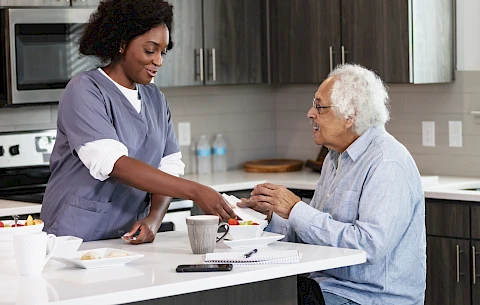
Proper nutrition plays a vital role in managing seniors' chronic diseases. Healthy eating can help control symptoms, increase energy levels, and improve quality of life. For family caregivers, ensuring their elderly loved ones maintain a balanced diet is a significant responsibility. Not only does it impact their health, but it also contributes to their well-being. Caregivers should be equipped with the knowledge to encourage and support healthy eating habits for the seniors they're looking after.
Balanced Diets and Chronic Disease
A balanced diet can significantly affect the management of chronic health conditions. Seniors need the right mix of nutrients to maintain their health and energy levels. Key nutrients include:
- Proteins: Essential for muscle repair and building strength
- Fiber: Helps with digestion, reduces cholesterol, and prevents constipation
- Vitamins and Minerals: Supports immune function and bone health
- Healthy Fats: Important for brain health and reducing inflammation
For example, a diet rich in calcium and Vitamin D can help combat osteoporosis, while antioxidants found in fruits and vegetables can reduce inflammation associated with conditions like arthritis.
Tips for Preparing Nutritious Meals
Preparing meals that are both nutritious and enjoyable can be a rewarding experience. When planning balanced meals, include a variety of fruits and vegetables, choose lean proteins like chicken, fish, or beans, opt for whole grains like brown rice and whole wheat bread, and limit sugary and salty foods. Some simple and healthy meal ideas include oatmeal with fresh berries and nuts for breakfast, grilled chicken salad with a variety of colorful vegetables for lunch, and baked salmon with quinoa and steamed broccoli for dinner.
Encourage seniors to stay hydrated. Sometimes, older adults don't feel thirsty even when they need water. Offer water, herbal teas, or flavored water to make hydration more appealing.
Overcoming Common Challenges
As a family caregiver, you might face several challenges when it comes to meal preparation. To address appetite loss, try serving smaller, frequent meals instead of three large ones, make meals visually appealing with a variety of colors, and include favorite foods to stimulate interest in eating. When managing dietary restrictions, be mindful of any allergies and medical conditions requiring special diets, and prepare meals that respect these restrictions without compromising taste or nutrition.
To make meals more appealing, use herbs and spices to enhance flavor without adding salt, try different cooking methods like grilling or steaming to keep foods interesting, and add dips or sauces made from healthy ingredients for added flavor.
To make meal planning easier and more effective, involve seniors in the process by letting them help with meal planning and preparation and taking them grocery shopping to pick out fresh produce or new foods to try. It's also important to monitor and adjust dietary plans. Keep track of their weight and health changes and consult healthcare professionals on necessary dietary adjustments.
Need Help in the Kitchen? We're Here for You!
Family caregivers play a vital role in supporting healthy eating habits and ensuring that their loved ones receive balanced, nutritious meals. By planning balanced diets, preparing appealing meals, and overcoming common challenges, they can make a significant difference in their loved ones' health and well-being.
Do you need help looking after an elderly loved one? Contact us at Senior Helpers Victoria. From personal tasks to meal planning and preparation, our professional caregivers can make your job easier while empowering seniors to live their best lives. We proudly serve the Victoria, Hallettsville, Cuero, Brenham, and San Marcos areas. Let us help you provide the best care possible.